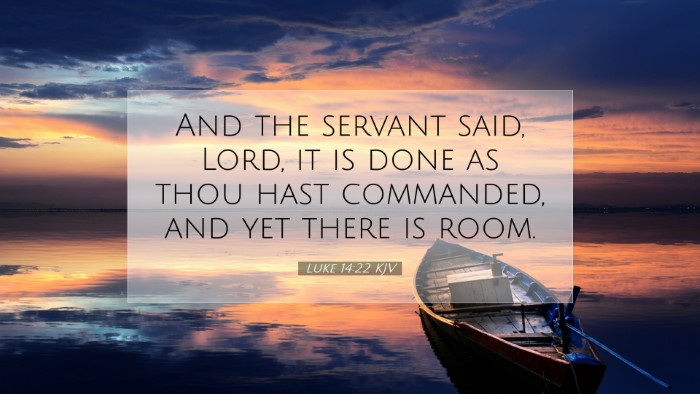Commentary on Luke 14:22
Verse Reference: Luke 14:22 - "And the servant said, 'Sir, what you commanded has been done, and still there is room.'
Introduction
This verse comes from a parable of Jesus regarding a great banquet, a powerful metaphor illustrating God's invitation to salvation and His kingdom. The servant's response reflects both fulfillment of the host's command and an indication of ongoing need for guests, presenting a poignant request for understanding God's purposes in calling individuals into His embrace.
Contextual Analysis
In Luke 14, Jesus discusses the nature of the kingdom of God, using the imagery of a feast to depict divine generosity and the call to participation in heavenly joy. The parable highlights the theme of inclusion, as those initially invited show indifference or offer excuses, leading the host to extend the invitation beyond the expected guests. The servant's reply emphasizes that God's house is continuously open, showcasing divine grace.
Insights from Public Domain Commentaries
Matthew Henry
Matthew Henry emphasizes the benevolence of the host in the parable, remarking that the continual room signifies the unending mercy and grace of God. The express acknowledgment of 'still there is room' indicates that even when many had declined the invitation, God's banquet remains spacious and inviting. This depiction affirms God’s readiness to welcome all who respond. Henry notes the importance of active obedience in the servant's task, serving as a model of fulfilling divine commissions while also being aware of the wider call for salvation.
Albert Barnes
Albert Barnes interprets this verse as a signifier of God's patience and desire for all to be saved. He elaborates on the phrase 'still there is room,' highlighting that God continuously seeks to include more into His fellowship. Barnes also comments on the implications of rejection: the initial guests represent the Jews who did not accept Christ, while the later guests signify the Gentiles, showcasing an expanding kingdom. This transition illustrates God’s plan reaching beyond the initial covenant people, thereby reinforcing the universality of the Gospel.
Adam Clarke
Adam Clarke provides an insightful textual analysis of the servant's acknowledgment. He argues that the servant's report reflects the ongoing commitment of the servants of God to carry out His will and remind us of the vastness of God's grace. Clarke highlights the servant as a type of Christ, faithfully conveying the host's call to the banquet. Moreover, he comments on the persistent 'room' as a metaphor for the ample provision of grace available to all who seek it. This perspective encourages the believer to actively invite others into fellowship, mirroring Christ's mission.
Theological Implications
Luke 14:22 serves as a rich theological anchor for discussions around God's grace and redemptive work. The ongoing 'room' invites a reflection on the openness of God's call, encouraging believers to recognize and respond to the needs of others while actively participating in God's mission. This verse builds upon themes of evangelism, inclusion, and the urgency of proclaiming the Gospel in a world often indifferent to divine invitations. It serves as a powerful reminder to church leaders and congregants alike to engage in outreach and cultivate a spirit of hospitality.
Practical Applications
- Evangelistic Outreach: Churches are called to invite those outside the faith into a relationship with God, echoing the principle that there is always 'room' for more in His kingdom.
- Hostility and Rejection: Acknowledge the rejection of the Gospel message in some quarters, but also embrace the hope that God’s invitation transcends barriers and reaches across divides.
- Servant Leadership: Emulate the servant's responsiveness in executing God's will with diligence and joy, recognizing a broader call to serve the community.
- Inclusion and Diversity: Foster a church environment that reflects the inclusivity of God's banquet; welcome diverse backgrounds and experiences as a testament to divine grace.
Conclusion
Luke 14:22 serves as a poignant reminder of God's unfailing love and invitation to His banquet, reinforcing themes of grace, inclusion, and the urgency of evangelism. Pastors, students, theologians, and scholars must reflect on these truths as they seek to deepen their understanding of God's desire for humanity and their role in sharing that good news. As our domestic and global contexts continue to evolve, may the church remain vigilant in proclaiming that in God's kingdom, there is always room for one more.


